Each session, middle school learners are presented with a writing challenge during Genre, which occurs twice each week during the afternoon. The writing challenge for learners in Session 2 is to complete a work of short fiction.
David Kirby
Recent Posts


Dear Whittle School Families,
We were sorry to read about the closing of the Whittle School’s DC campus.
We invite those who are quickly searching for alternatives to sign up for a virtual tour of Acton Academy of Washington, DC in Foggy Bottom. We have few spaces for the 2022-23 school year as follows:
- Two spaces left in our Montessori primary program (ages 3-6)
- One space left in our lower elementary program (grades 1-3)
- Two spaces in our upper elementary program (grades 4-5)
- Two spaces in our middle school program (grades 6-8)
Acton Academy of Washington, DC was founded in 2018—about the same time as the Whittle School. We have deliberately chosen to grow slowly, carefully, serving one family at a time. We take our promises seriously. And we have have quietly earned a reputation for excellence.
This year, we were pleased that U.S. News & World Report named Acton on a list of ten top DC private elementary schools including Sidwell Friends, Beauvoir National Cathedral School, Georgetown Day School, and Maret.

U.S. News & World Report names Acton Academy of Washington, DC on a list of ten DC private elementary schools including Sidwell Friends, Beauvoir National Cathedral School, Georgetown Day School, and Maret.
Acton is the relative newcomer to Washington, DC’s scene of “very prestigious and strong” private schools. Acton was founded in 2018 and approaching its 5th birthday. However, Acton has already distinguished itself among the 72 private schools in the city and quickly earned a reputation for excellence.
Acton is unique. Acton combines Montessori ideas, Harvard Business School-style Socratic discussions, mixed-age classrooms, and real-world projects like the Acton Children’s Business Fair. Acton invites children to imagine themselves as the heroic protagonist in their own journey in life. At Acton, children discover their unique talents and passions while developing the habits of mind and character needed to chase down their dreams with energy and joy.
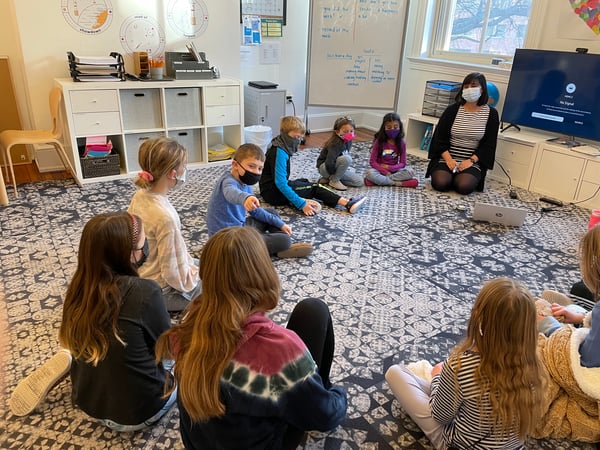
As part of orienting new parents to Acton Academy’s unique approach, we host Acton Parent Journey Meetings throughout the year. Topics have included Introduction to the Hero’s Journey, Growth Mindset, and Introduction to Socratic Guiding, the first topic of the 2021-22 school year. For this session, parents learned by doing, participating in a Socratic discussion just like their elementary and middle school children, and playing a “Never Answer a Question” game to practice being Socratic.

Originally published on Let Grow on 11/29/2021
Traditional approaches to teaching entrepreneurship too often become a boring exercise in classroom abstraction.
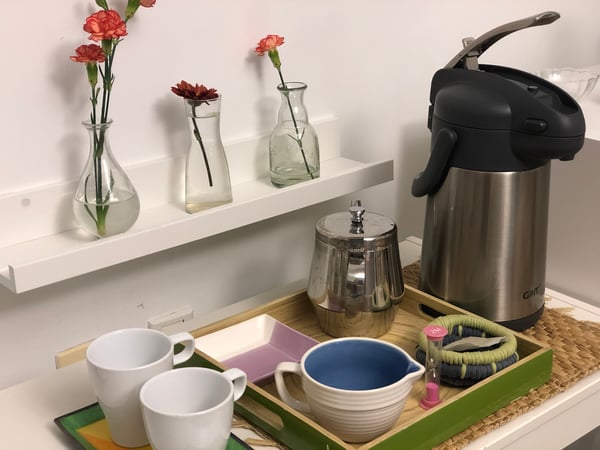
Montessori learners start the week with many new lessons and materials to choose from on the shelves. One of their favorites has been tea making.
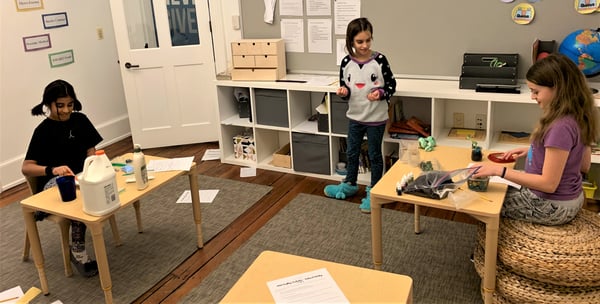
Not only does a new quest begin every session, but a new Writer’s Workshop as well. Challenges in Writer’s Workshop afford the learners opportunities to make connections and to apply the knowledge they have gained during the hands-on projects of quest time. A past session’s Writer’s Workshop focus was technical writing, a genre closely connected with creating and revising code, the main learning objective of the coding quest.
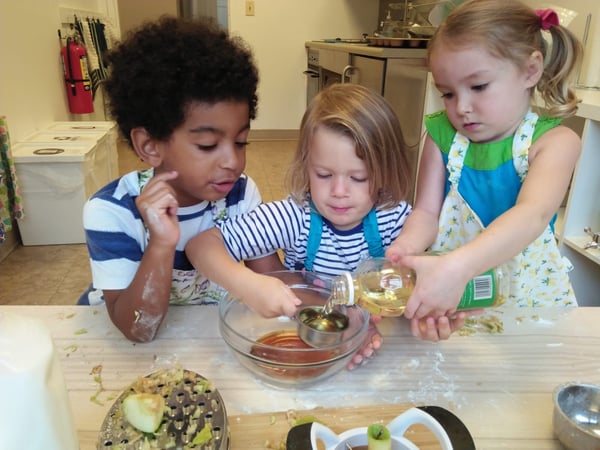
Montessori learners have been busy in the kitchen! They’ve been slicing, measuring, grating, spreading, and, of course, eating (their favorite part). Participating in kitchen-centered activities is a fun and easy way to refine gross and fine motor skills, build concentration, and practice sequencing. For example, when we bake, we always separate our dry and wet ingredients. Don’t forget to taste and feel as you go—Is it sticky or soft? Does it taste savory or sweet?
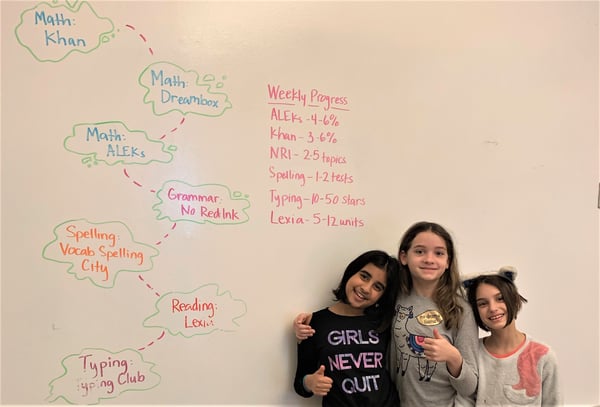
There are many ways learning is tracked in the elementary studio. Broadly speaking, learning is categorized in three ways: learning to learn, learning to do, and learning to be. LTL is factual knowledge and skills, LTD is the application of knowledge and skills to real-life situations, and LTB is the increased understanding of the self and the life one is leading based on evaluation and reflection. More specifically, learning is tracked through SMART goals, weekly progress meetings, badges, points, and now, weekly progress standards.
Every day at the beginning of core skills time, learners set SMART goals in their challenge zone. At the end of core skills time, learners complete the SMART goals by entering their progress. If they meet or exceed their goals, points are earned. One hour of focused work is worth about 20 points. Originally, learners had to reach a point goal in order to participate in Scholar’s Choice on Friday afternoons. Scholar’s Choice is a learner’s opportunity to expand their knowledge of a subject about which they are passionate; they can paint, read, practice a language, cook, or exercise. It’s also a mini-celebration of a week of hard work.
But points were proving to be an inaccurate and, at times, seemingly unfair representation of a learner’s work and progress that week. If a learner spends an hour practicing spelling, only to not pass the test at 100% and therefore earn zero points, is that an accurate assessment of determination, grit, and progress? If a learner spends most of the week working in Lexia, the reading program, because it’s in her comfort zone and has the highest potential for points earned, but does not make progress in any other program, does that align with the badge plan goals for the year? The learners thought definitely not.
So they decided to introduce a new process. While the learners continue to monitor points as one indicator of progress, they have created weekly progress standards for each of the seven online programs. For example, by the end of the week, a learner must increase three to six percent in Khan Academy and master two to five topics in No Red Ink, the grammar program. These ranges are in their challenge zone (just difficult enough to push them, but not so hard that they are too stressed to move forward) and give them a good idea of how much time they should be spending on each program to make progress across all subjects. The standards also reward perseverance; maybe on Tuesday you practiced for that spelling test and didn’t pass, but on Thursday you tried again and did. Now, if you meet the weekly progress standards, you are able to participate in Scholar’s Choice.
The new process has proven effective. Math percentages and grammar progress has increased while reading progress has stayed stable. The process will continue to be tweaked as learners move forward with their goals. Reflections have shown that flexibility and a wide definition of progress are great motivators for success.
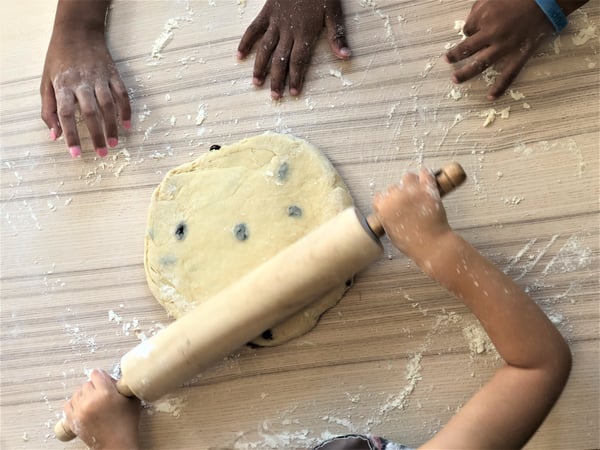
Snack in the Montessori studio is centered around simple, healthy foods the children can prepare and eat independently. Every day we have a carbohydrate such as multi-grain crackers or whole-wheat pita bread (cut into small pieces) accompanied by a spread like cream cheese or homemade hummus and a fruit or vegetable such as sliced apples or celery.